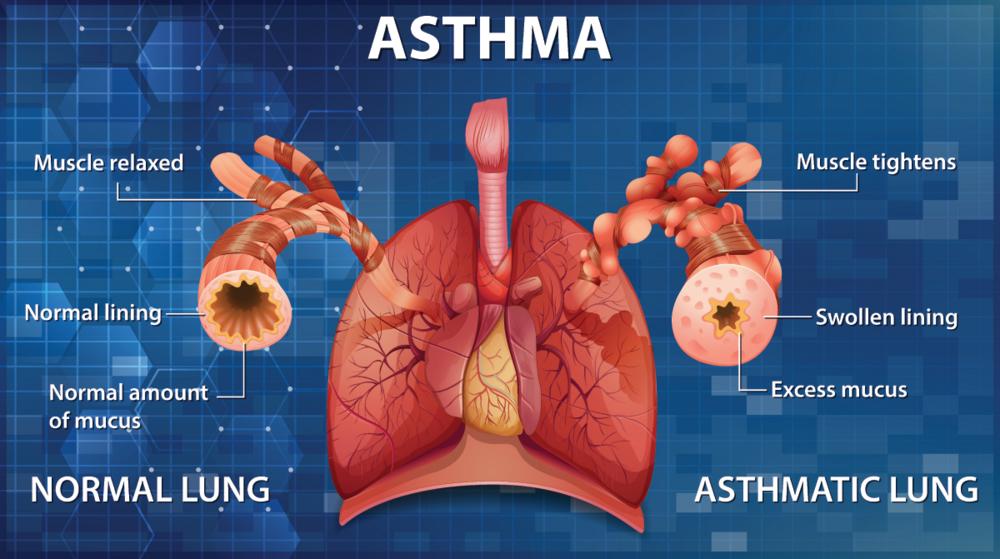- 28-Mar-23
People of all ages can suffer from asthma, but it frequently first appears in children. With the proper care, which may include medications like inhaled corticosteroids, bronchodilators, and leukotriene modifiers, as well as preventing triggers and following an asthma action plan, it can be controlled.
Lung airways are impacted by asthma, a persistent respiratory illness. It is characterized by narrowing of the airways and inflammation, both of which can make breathing difficult. When certain triggers, such as allergens, exertion, cold air, tension, or respiratory infections are present, people with asthma have sensitive airways that react. When triggered, the airways become inflamed and swollen and the muscles around them tighten, making breathing difficult. Brevity shortness of breath, cough, chest tightness, wheezing and other symptoms from this.
Asthma Meaning in Urdu:
دمہ- ایک سانس کی بیماری ہے جو سانس لینے میں دشواری کا باعث بن سکتی ہے۔ دمہ کے مریضوں کو سانس لینے میں دشواری، کھانسی، سینے میں درد، نیند میں بے چینی اور تھکاوٹ جیسی علامات کا سامنا ہوسکتا ہے۔ دمہ کا کوئی علاج نہیں ہے، لیکن علاج اس بیماری کو روکنے اور اسے کم شدید بنانے میں مدد کر سکتا ہے۔
Symptoms of Asthma:
From moderate to severe, asthma symptoms can vary from person to person. Typical asthma symptoms include:
- Wheezing – breathing that makes a high whistling sound, especially when exhaling.
- Cough – Continued wheezing, especially at night or at night morning.
- Chest tightness – Feeling of pressure or tightness thorax.
- Breathing problems - Shortness of breath, especially when during exercise or around asthma triggers.
These symptoms can be intermittent or persistent and can appear at any time day or night time. In some cases, people with asthma may appear symptoms only at certain times of the year, for example with allergies season. In severe cases, asthma symptoms can quickly worsen and lead to an asthma attack, which can be life-threatening if not treated in time. An asthma episode may present with intense wheezing, breathing problems, rapid breathing, and blue lips or skin.
Causes of Asthma:
Although the precise cause of asthma is still unclear, genetic and environmental factors are thought to play a part in its development. Some of the factors that can contribute to the development of asthma include:
- Genetics – Asthma can run in families and some genes do increase a person's risk of getting asthma.
- Allergens – For some individuals, exposure to allergens like mold, dust mites, pollen, or pet dander can exacerbate their asthma symptoms.
- Environmental factors - Exposure to air pollution, chemicals, or Irritants such as tobacco smoke can also contribute to development of asthma.
- Respiratory infections -Some individuals may experience asthma symptoms after contracting a viral respiratory infection like the common cold.
- Obesity - Being overweight or obese has been associated with increased risk of developing asthma.
- Stress – Emotional stress can trigger asthma symptoms in some people.
When to See a Doctor:
Seek immediate medical attention if you frequently experience wheezing or significant shortness of breath, particularly at night or in the early morning or if you have other asthma symptoms.
IMC Hospital is a renowned institution and is often referred to as one of the Best Hospitals in Pakistan. At IMC Hospital, a group of qualified seniors, and board-certified physicians who have extensive clinical and professional experience, serving at the most renowned and respected medical institutions worldwide are now available under one roof. Visit today to book an appointment at Integrated Medical Care Hospital (IMC Hospital).
Dr. Maaz Suhail Rana
MBBS, MRCP (UK), MRCP (London), SCE Respiratory Medicine (UK).
Specialties: Pulmonology & Intensive Care.
Areas of Focus: Pulmonary infections, chronic cough, asthma, chronic bronchitis, lung fibrosis, lung involvement in autoimmune disease, respiratory failure and use of non-invasive ventilation, lung cancer, bronchoscopy, ultrasound-guided minimally invasive chest drain insertion, and pleural fluid drainage.

 Map
Map










